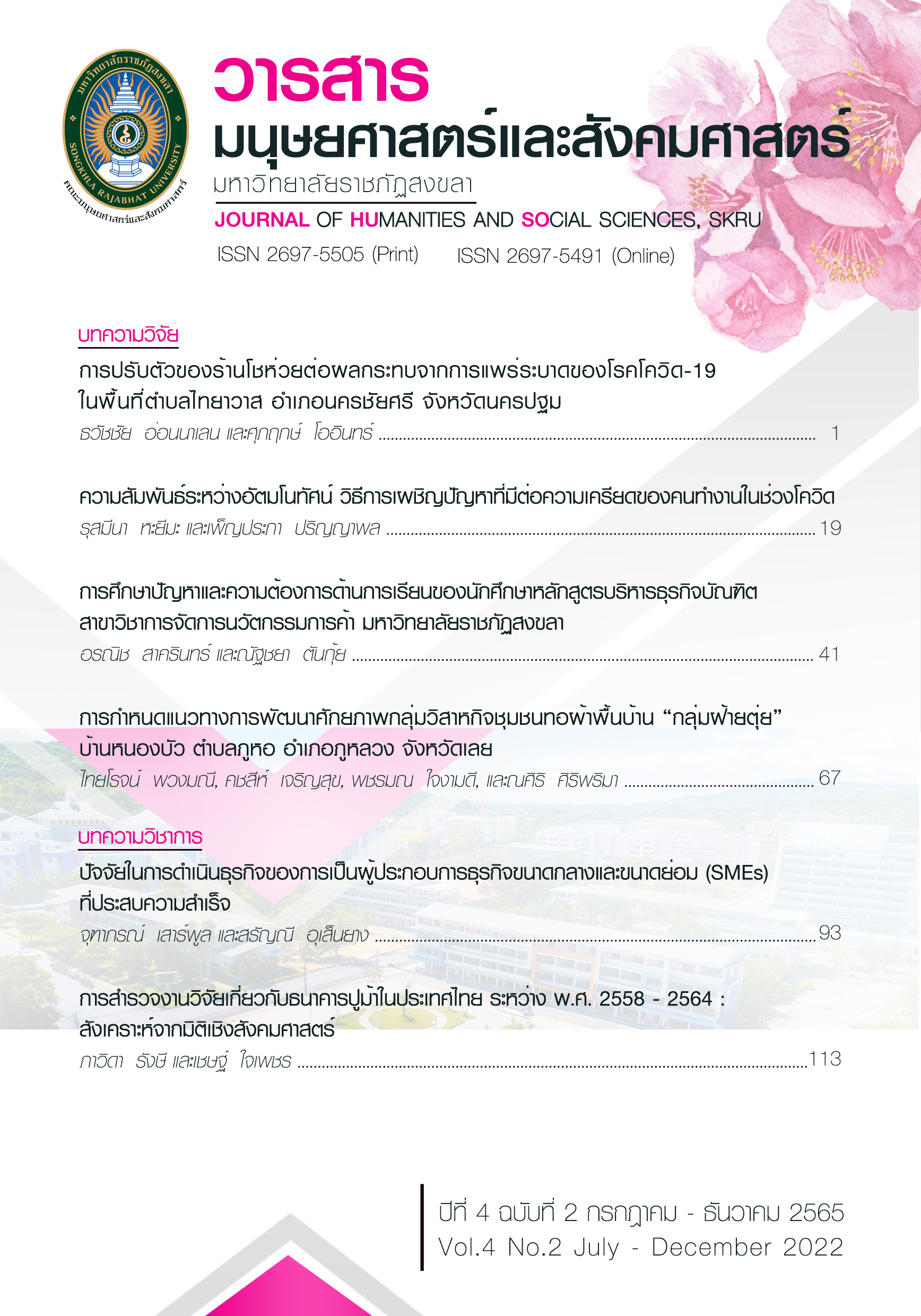ADAPTATION OF GROCERY STORES TO THE IMPACT OF THE COVID-19 EPIDEMIC IN THAIYAWAT SUBDISTRICT, NAKHON CHAI SI DISTRICT, NAKHON PATHOM PROVINCE
Main Article Content
Abstract
This research aims to study the current situation, the impact of COVID-19 pandemic situation, and adaptation of grocery stores in Thaiyawat Subdistrict, Nakhon Chai Si District, Nakhon Pathom Province by using the technique of interviewing the population of 29 grocery store’s shopkeepers in the study area and analyzing data using content analysis techniques. The results showed that the current situation of running a grocery store business was found having an unsystematic business model, with no store accounting, no warehouse control, and no technology is used. As a result, the grocery stores' number of customers, sales, and income have decreased in the past. As for the impact of the COVID-19 pandemic, it was found, in terms of the economy, that grocery stores are most affected by the market share competition of the convenience store business. In terms of health, most of the shopkeepers are affected by stress from economic problems, and in the social aspect, the grocery stores have been affected by the rapid change in customer buying behavior so that the shopkeepers can't adjust. In terms of economic adaptation, it was found that most of the shopkeepers have adapted by turning to join projects launched by government assistance measures, such as the Blue Flag Project, the Rao Chana (We win) Project, and Khon La Khrueng (Co-payment) Projects, etc. The adaptation in health aspect was found that the shopkeepers solved the problem by finding activities to reduce stress, and social aspects were found that the shopkeepers have adapted by using more payment methods and promoting new products through online channels.
Downloads
Article Details

This work is licensed under a Creative Commons Attribution-NonCommercial-NoDerivatives 4.0 International License.
ลิขสิทธิ
References
กรณิกา สุริยะกมล, และฉัตรวรัญ องคสิงห์. (2562). ร้านโชห่วยกับการอยู่รอดในยุคเศรษฐกิจดิจิตอล. การประชุมนำเสนอผลงานวิจัยบัณฑิตศึกษาระดับชาติ ครั้งที่ 14 ปี การศึกษา 2562 (หน้า 1-11). กรุงเทพฯ: มหาวิทยาลัยหอการค้าไทย.
กรรณิการ์ แสนสุภา, เอื้อทิพย์ คงกระพันธ์, อุมาภรณ์ สุขารมณ์, และผกาวรรณ นันทะเสน. (2563). “การปรับตัวของนักศึกษาในสถานการณ์โควิด-19”. วารสาร มจร มนุษศาสตร์ปริทรรศน์. 6(2), 83-97.
ฉันทัส เพียรธรรม, และวันทนาพร รุ่งวรรณรัตน์. (2555). “การปรับตัวของร้านโชห่วยภายใต้กระแสการขยายตัวของร้านสะดวกซื้อสมัยใหม่”. วารสารการจัดการสิ่งแวดล้อม. 8(1), 39-55.
ธีรภัทร เจริญฤทธิ์, และนฤภร ไชยสุขทักษิณ. (2564). การปรับตัวของผู้ประกอบการในสถานการณ์การระบาดของเชื้อไวรัสโคโรนา 2019 (COVID-19) กรณีศึกษา ตลาดกิมหยง อำเภอหาดใหญ่ จังหวัดสงขลา. สืบค้นเมื่อ 30 มกราคม 2564, จาก http://www2.huso.tsu.ac.th/ncom/csd/csdful_pdf/c219.pdf
พัฒน์กมล อ่อนสำลี. (2564). “การปรับตัวของวิสาหกิจชุมชนในสภาวะการแพร่ระบาดของโรคติดเชื้อไวรัสโคโรนา 2019”. วารสารวิทยาการจัดการปริทัศน์. 23(1), 195-205.
เพ็ญลักษณ์ ทองศรี. (2563). “แนวทางการปรับตัวในการดำเนินธุรกิจร้านค้าปลีกแบบดั้งเดิม อำเภอบางปลาม้า จังหวัดสุพรรณบุรี”. วารสารวิทยาลัยดุสิตธานี. 14(3), 447-460.
วัฒนะ สุขขวัญ. (2563). ทัศนคติของผู้บริโภคที่มีต่อร้านอาหารที่ปรับตัวในช่วงวิกฤต covid-19 ในเขตกรุงเทพมหานคร. ค้นคว้าอิสระปริญญาบริหารธุรกิจมหาบัณฑิต สาขาวิชาการตลาด. คณะบริหารธุรกิจ, มหาวิทยาลัยรามคำแหง. กรุงเทพฯ: มหาวิทยาลัยรามคำแหง.
วิทวัส รุ่งเรืองผล. (2556). โครงการส่งเสริมร้านค้าปลีกไทย และประเภทร้านสะดวกซื้อ (โชห่วย). วิทยานิพนธ์คณะพาณิชยศาสตร์และการบัญชี. บัณฑิตวิทยาลัย, มหาวิทยาลัยธรรมศาสตร์. กรุงเทพฯ: มหาวิทยาลัยธรรมศาสตร์.
สุจินดา เจียมศรีพงษ์. (2553). ปัญหาและแนวทางแก้ไขเพื่ออนาคตของการค้าปลีกที่ยั่งยืน. พิษณุโลก: มหาวิทยาลัยนเรศวร.
สุรเชษฐ์ ตาคำ. (2554). ความคิดเห็นของประชาชนกับผลกระทบจากการสร้างอาคารสูงชุมชนซอยวัดอุโมงค์ ตำบลสุเทพ อำเภอเมือง จังหวัดเชียงใหม่. วิทยานิพนธ์สาขาวิชาการจัดการมนุษย์กับสิ่งแวดล้อม. บัณฑิตวิทยาลัย, มหาวิทยาลัยเชียงใหม่. เชียงใหม่: มหาวิทยาลัยเชียงใหม่.
Roy, C., and Andrews, H. (1999). The Roy’s Adaptation Model. Stamford, Conn.: Appleton & Lange.


